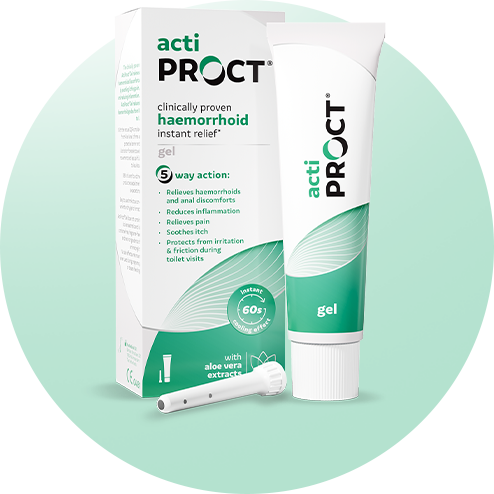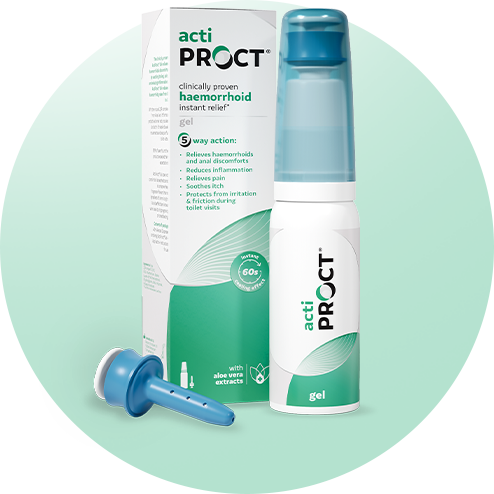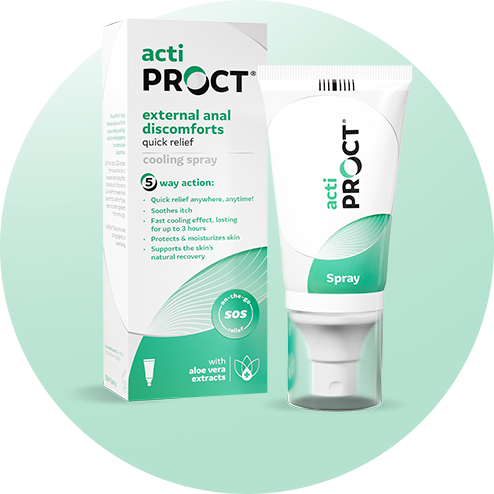Haemorrhoids while pregnant
Your body goes through all sorts of changes during pregnancy, and one of the more irritating of these can be haemorrhoids. It’s very common to get piles in pregnancy, even if you’ve never had them before.
Luckily, in the majority of cases, they are not harmful to either you or your baby. Although labour can make them worse in the short term, they normally clear up not long after you’ve given birth.
This article covers some of the reasons why you might develop pregnancy haemorrhoids and gives you an idea of the type of symptoms to expect.
It also covers several of the most effective piles in pregnancy treatment options, from simple remedies you can try at home to baby-safe medication.
Read on to discover:
Causes pregnancy haemorrhoids
Haemorrhoids (also known as piles) are enlarged veins in and around your anus or rectum and generally develop as a result of excess pressure in this area of the body.
They can be divided into two main types:
There are lots of reasons why being pregnant increases your chances of developing haemorrhoids, especially in the third trimester and during or shortly after childbirth itself. The following are some of the most common causes of piles in pregnancy.
Hormones
Your hormones change a lot while you’re pregnant. This includes an increase in the production of progesterone, which has the effect of relaxing the walls of your veins.
This, in turn, makes them more susceptible to swelling and haemorrhoids developing as a result. When combined with the increased blood volume during pregnancy, which enlarges your veins, the impact is even greater.
Pressure from your baby
As your unborn baby and uterus grow larger, they can start to press against your pelvic region. This results in greater pressure on the veins in your rectum and anus, which may cause the development of piles in pregnancy.
Likewise, the strain of carrying around extra weight when you’re pregnant can also contribute to the formation of haemorrhoids.
Constipation
Constipation is another common symptom for women to experience during pregnancy. This is due to factors such as hormonal changes, reduced activity, and pressure from the uterus.
It also has the unfortunate side effect of making it more likely that you’ll develop haemorrhoids too. The reason constipation can cause piles is because spending a lot of time on the toilet and straining during defecation both increase pressure on the veins in the rectum and anus.
In addition, because constipation tends to result in stools that are drier, larger, and harder, this increases the risk of damage to the lining of the anus. This is also one of the reasons why you might develop an anal fissure in pregnancy.
Symptoms of pregnancy haemorrhoids
The type of symptoms you experience with piles in pregnancy will depend on the type, location, and severity of your haemorrhoids. Some of the most common symptoms you may experience are:
Although internal piles generally result in fewer symptoms than external piles, sometimes they may pop out of the rectum and need to be pushed back in. It’s safe to do this, but be sure to wash your hands thoroughly before and after doing so.
Symptoms of thrombosed haemorrhoids in pregnancy
A haemorrhoid may also become thrombosed, which means that a blood clot forms inside of it. This is most commonly seen with external haemorrhoids, and can make them swell and turn a dark blue colour.
Although a thrombosed haemorrhoid in pregnancy is more painful compared to normal piles in pregnancy, it’s generally nothing to worry about.
One factor to note is that it’s possible for a thrombosed haemorrhoid to burst due to the buildup of blood, which will cause bleeding. This may last anywhere from a few seconds to several minutes.
It’s normally unproblematic, but if the bleeding is heavy or lasts more than 10 minutes, you should seek medical attention.
Treatment for piles in pregnancy
Many women worry about having haemorrhoid treatment in pregnancy and how it might impact their baby. The good news is that regardless of the type or severity of pregnancy haemorrhoids you have, in the majority of cases, they will clear up after you give birth.
In the meantime, you should be able to successfully ease your symptoms with home remedies.
Home remedies for pregnancy haemorrhoids
A haemorrhoid may also become thrombosed, which means that a blood clot forms inside of it.
There are plenty of methods you can try that will help to relieve the pain or discomfort you may be feeling from piles in pregnancy without the need for medical treatment. For example:
Home remedies for pregnancy constipation
If you’re suffering from constipation that’s contributing to your piles in pregnancy, the following tips can help:
Medication
Sometimes it can be helpful to take some medication in order to cope with piles in pregnancy. You should always talk to your doctor, pharmacist or midwife about what options there are for a painkiller, haemorrhoid cream or a suitable laxative during pregnancy. That way, you can be confident that whatever you use will be safe for both you and your baby. This includes:
Hospital treatment
In severe cases of piles in pregnancy, your doctor might recommend hospital treatment. This could include procedures such as rubber band litigation, sclerotherapy, infrared coagulation, or a haemorrhoidectomy.
However, if possible, it will likely be preferable to wait until after the birth of your child before opting for hospital treatment. In most instances, pregnancy haemorrhoids go away on their own shortly after labour.
How to prevent piles in pregnancy
Although you can’t do anything about the hormonal changes and pressure from the baby that may cause pregnancy haemorrhoids,you can still take steps to reduce the chances of getting piles. Many of these recommendations are aimed at preventing constipation, as this is the other major cause of piles in pregnancy. For example:
Don’t forget that you can always speak to your doctor or midwife if you have any concerns.
FAQ – Pregnancy haemorrhoids
How can a pregnant woman get rid of piles?
You can get rid of pregnancy haemorrhoids in much the same way as you would if you weren’t pregnant. The only difference is that you should speak to your doctor before using piles cream in pregnancy to ensure you choose one that’s safe for your baby.
The best advice is to stay hydrated, eat a fibre-rich diet, and keep active. In addition, avoid straining or spending too long on the toilet. When it comes to easing pain or itchiness safely, warm baths, cold compresses, and treating the area gently will go a long way.
Can piles affect pregnancy?
It’s understandable if you’re concerned that having piles in pregnancy will affect your pregnancy or your baby. Rest assured that there’s no evidence to suggest this is the case. Of course, if you have any worries, be sure to discuss them with your doctor or midwife.
How long do pregnancy piles last?
Pregnancy haemorrhoids are most common in the third trimester and can be exacerbated by the birth itself. In most cases, they will last until after the baby is born and disappear on their own anywhere from a few days or several weeks later. If yours last longer than this or start to get worse, make sure you see a doctor.
Should I go to the doctor about piles in pregnancy?
Although pregnancy haemorrhoids are nothing to worry about in the vast majority of cases, you should still see your doctor if you’re having symptoms.
That will enable them to do an examination and make sure that you’re not suffering from another, more serious condition that presents with similar symptoms. This is especially true if your symptoms are getting worse or not improving with home remedies.
If you do have piles in pregnancy and suffer from any of the following symptoms at the same time, speak to a doctor immediately:
- Severe bleeding
- Bleeding that won’t stop
- Intense pain
- Pus leaking from your haemorrhoids
- Fever or chills



